#State of Paraná
Explore tagged Tumblr posts
Text
LOS ANGELES LAKERS X ATLANTA HAWKS | (NARRAÇÃO AO VIVO) | TEMPORADA REGULAR 2024/25

Full Watch Here https://sfl.gl/8C1Llkk
#Federal District#State of Acre#State of Alagoas#State of Amapá#State of Amazonas#State of Bahia#State of Ceará#State of Espírito Santo#State of Goiás#State of Maranhão#State of Mato Grosso#State of Mato Grosso do Sul#State of Minas Gerais#State of Pará#State of Paraíba#State of Paraná#State of Pernambuco#State of Piauí#State of Rio de Janeiro#State of Rio Grande do Norte#State of Rio Grande do Sul#State of Rondônia#State of Roraima#State of Santa Catarina#State of São Paulo#State of Sergipe#State of Tocantins#LakersVsHawks#NBA2025#LiveGame
0 notes
Text
Bonus Poll









The current flag of Chicago, Illinois, United States vs The current flag of Ħad-Dingli, Northern Region, Malta vs The current flag of Kansas City, Missouri, United States vs The current flag of Lethbridge, Alberta, Canada vs The current flag of Litichovice, Central Bohemian Region, Czechia vs The current flag of Midway, British Columbia, Canada vs The current flag of Palotina, Paraná, Brazil vs The current flag of Rockville, Maryland, United States vs The current flag of Wichita, Kansas, United States
#cft bonus polls#eyestrain#eyestrain: color#flag: Chicago - Illinois - United States#flag: Ħad-Dingli - Northern Region - Malta#flag: Kansas City - Missouri - United States#flag: Lethbridge - Alberta - Canada#flag: Litichovice - Central Bohemian Region - Czechia#flag: Midway - British Columbia - Canada#flag: Palotina - Paraná - Brazil#flag: Rockville - Maryland - United States#flag: Wichita - Kansas - United States
53 notes
·
View notes
Text

Interesting rock formations and a pine tree in the State of Paraná, Brazil
French vintage postcard
#postcard#rock#pine#carte postale#vintage#postkarte#photography#paraná#tree#postkaart#brazil french#formations#french#photo#tarjeta#brazil#briefkaart#historic#paran#state#interesting#postal#ansichtskarte#sepia#ephemera
4 notes
·
View notes
Text
Donate to victims of Brazil floods from abroad
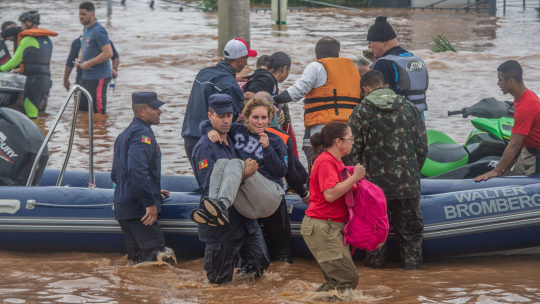
Brazil’s southernmost state of Rio Grande do Sul, a state the size of Ecuador, has been devastated by historic floods, with most of its 497 municipalities in a state of public calamity. Authorities have described the crisis as “war-like” and consider it the state’s worst crisis caused by natural disasters ever.
Roughly 200,000 people were forced out of their homes, according to state officials. The death toll, which has been growing fast, is inching closer to the mark of 100 — and there are still more than 130 people missing.
A series of public and private initiatives are collecting donations in order to mitigate the devastating effects of the crisis. Post offices in the states of São Paulo and Paraná, as well as some in Rio Grande do Sul, for example, offered to collect and transport donations free of charge.
Continue reading.
#brazil#brazilian politics#politics#environmental justice#mutual aid#rio grande do sul floods 2024#mod nise da silveira#image description in alt
3K notes
·
View notes
Note
Can we have some love thrown at Cyanocorax caeruleus? This bird species is the symbol of my home state in Brazil because of it's importance in propagating the local pine tree. I find their blue and black colors very beautiful!




Azure Jay aka Gralha Azul (Cyanocorax caeruleus), family Corvidae, order Passeriformes, found in the Atlantic Coastal Forests of Brazil
This bird is closely associated with the endangered Paraná Pine, acting as a major seed disperser for this tree.
photos: Dario Lins, Takao Takayama, & Ian Thompson
328 notes
·
View notes
Text
Botanical Garden, Curitiba, Brazil: The Jardim Botânico de Curitiba, also known in English as the Botanical Garden of Curitiba and formally referred to as Jardim Botânico Fanchette Rischbieter, is a prominent park situated in Curitiba, the capital of the state of Paraná in southern Brazil. It is a key tourist attraction and landmark within the city and houses a portion of the Federal University of Paraná campus. The international identification code for the garden is CURIT. Wikipedia
#Jardim Botânico de Curitiba#Botanical Garden#Jardim Botânico Fanchette Rischbieter#Botanical Garden of Curitiba#Curitiba#Parana#Brazil#south america#south american continent
215 notes
·
View notes
Text
*: During the great European Immigration to the Americas (19th century - 20th century), immigrants from different European countries settled in different parts of Brazil. Southern states, such as Rio Grande do Sul, due to their colder climates, were favored by immigrants from Northern European countries, such as Germany, Poland, Austria and Ukraine, where blonde hair and blue eyes is a common phenotype. Therefore, blonde hair and blue eyes are seen more often in people from Rio Grande do Sul and other southern states than in the rest of Brazil. This makes my joke funny and you should either laugh at it or praise me for my quick wit and good looks.
Incredibly amused by this one upcoming anime that has a foreign girl as one of its main characters and she looks like your average token anime foreigner (white, blond haired, blue eyed, you know the drill), except she’s Brazilian. First time I ever see a blue-eyed blonde Brazilian character in literally any piece of non-Brazilian made media. If my grandpa was still alive I’d give him a call to congratulate him on the representation win.
#Not that you don’t find this phenotype in other states at all I mean#But funnily enough my grandpa WAS from a southern state lol#He was born in Paraná. His mom was a German immigrant and his dad was a Portuguese immigrant
543 notes
·
View notes
Photo

Sebastião Salgado. Landless peasants. Giacometti plantation. State of Paraná. Brazil. 1996
I Am Collective Memories • Follow me, — says Visual Ratatosk
#BW#Black and White#Preto e Branco#Noir et Blanc#黒と白#Schwarzweiß#retro#vintage#Sebastião Salgado#landless peasants#Giacometti plantation#Paraná#Brazil#1996#1990s#90s#family#portrait#肖像#画像#retrato#Porträt#kids#children#crianças#gamins#enfants#Kinder#子供たち#児童
278 notes
·
View notes
Photo

Iguazú Falls or Iguaçu Falls, border of the Argentine province of Misiones and the Brazilian state of Paraná
919 notes
·
View notes
Text
Bonus Poll



The current flag of Palotina, Paraná, Brazil vs The current flag of Portland, Oregon, United States vs The current flag of São Paulo, São Paulo, Brazil
#cft bonus polls#flag: Palotina - Paraná - Brazil#flag: Portland - Oregon - United States#flag: São Paulo - São Paulo - Brazil
5 notes
·
View notes
Text
Thanks, bro B)

I will now share the different reasons I like to think to why they are in Japan:
Yabusames - Obviously was the song industry, probably a contract with some producer made them move (And I like to think that since Reko was a rebellious little shit (affectionately), she purposely refused to learn Japanese until Alice convinced her)
Kurumada - He was born in Japan, but his parents are brazilian, so he regularly visit Brazil (He's very fond of his Brazil but it's not willing to move out of Japan, he regularly lets a brazilian slang slip so people get to know where he's from and that he's proud of it)
Hinako - She was born in Brazil, but only stayed there when she was a little kid, moving to Japan with her parents and now just lives there (I have a headcannon that she's the type of person who would just lie about what she's saying, she'd 100% just swear at people in Portuguese and then say "Oh no, I said you're beautiful, don't worry…", just spreading misinformation)
Hi, I'm here to cook with my brazilian headcannons, and I will not explain why I think these character are brazilian (Theoretically, they would be half brazilian and half asian, so...)
Just trust me on these ones, I know what I'm talking about 😎 /hj (I'm brazilian)



#AK Posting#YTTD#Headcanon#I have WAY to much time to think about this...#Also wich state of Brazil they are from#Yabusames: Espírito Santo#Kurumada: Rio Grande do Sul#Hinako: Paraná
20 notes
·
View notes
Text

Pines in the State of Paraná, Brazil
Brazilian vintage postcard
#photography#vintage#ephemera#state#brazilian#sepia#pines#paran#carte postale#postkarte#briefkaart#tarjeta#postal#historic#postkaart#photo#ansichtskarte#paraná#brazil#postcard
5 notes
·
View notes
Text
Climate change is undeniable
Brazil's southernmost state, Rio Grande do Sul, is going through the worst flood of its history. Almost half the state is underwater, including state capital Porto Alegre. There are pictures in news sites that are absolutely terrifying. I have seen videos of at least five different bridges being carried out the the water in the past four days only.
Rio Grande do Sul underwent a big flood last September, and it was already incredibly frightening. There were storms in June and November too, but September was bigger. And this current storm has been lasting longer already. Things are likely to get worse in the next week - weather forecast says rain will give the state a break starting tomorrow, May 5th, but by the 8th it should be raining again.
The pictures explain better than my words can:
youtube
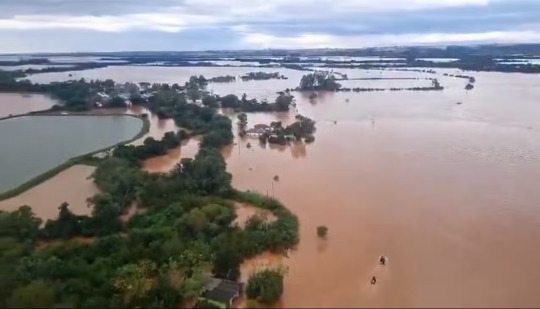
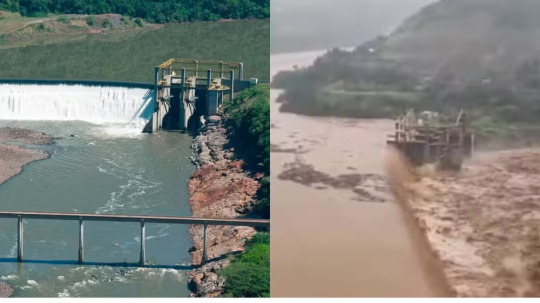
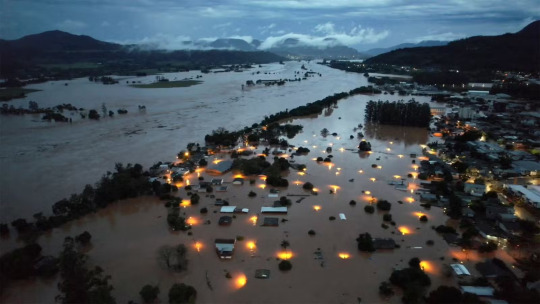
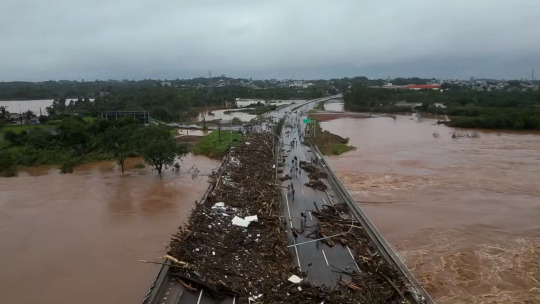
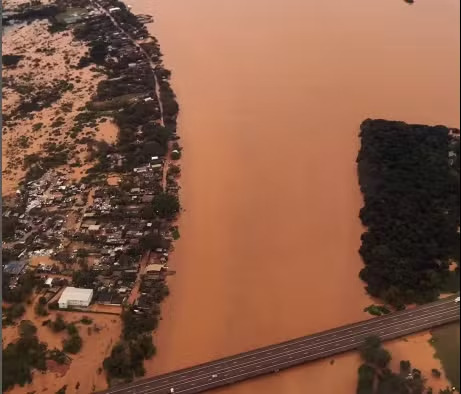
But if Rio Grande do Sul and its neighboring state Santa Catarina have been facing massive floods, the rest of the country is going through the fourth heat wave of 2024 (they consider a heat wave when the weather is over 5° C above the average temperature, for several days). Now, you must be thinking: Brazil is a tropical country, it's supposed to be hot.
It's not supposed to be 37° C in fucking May.
We have a state in the southern region, called Paraná, whose capital city, Curitiba, is the coldest state capital in Brazil. In fact, there is a stereotype (very much confirmed) that Curitibans are insufferable when it comes to talking about the weather, because no Brazilian, in any place of the internet, talking from anywhere in Brazil, can complain about the cold without a Curitiban showing up from nowhere and saying "well, but here in Curitiba is colder". They really are that insufferable.
Curitiba's average temperature for May is 12° C to 21° C. I just checked: it's 28° C right now. Curitibans have taken to forums to complain about the heat, which must be unheard of, because those assholes (I love you guys, but you're assholes) can't stop talking about the cold all damn year. I have never, in 40 years of life, have seen them talking about the heat so much.
When I was a kid, i used to wear coats for some periods of the year. Rio has never been a place to wear heavy coats, but you know, long-sleeved shirts, a denim jacket during the winter? Normal.
I can't remember the last time I consistently wore a jacket. It was probably before the pandemic, and only because of the air-conditioner at work. It just isn't cold enough to wear anything more than short sleeves for more than three or four days in the entire year.
Climate changes are undeniable. Anyone who's denying it is either incredibly stupid or incredibly ill-intentioned.
102 notes
·
View notes
Note
I am watching a video with criticism of geographical determinism in worldbuilding and realized that I don't really remember seeing any fictional stereotypic merchant state that relies on rivers.
Norse and Rus were whom I had in mind, but to my knowledge British and Japanese people also heavily utilized rivers for trade and I would be very surprised if Ancient Chinese people didn't.
I don't know about history of First Nations of North America and did they have trade in our understanding, but I heard that river system of North America is so convenient that the entire 19th century demand for transportation could have been covered by it alone, without trains.
Just some ideas
Freshwater systems are woefully underused in worldbuilding. The other day I was reading about the history of my region and I was amazed at how big and sophisticated native canoes were in the Paraná, the Paraguay and the Amazonas, and how virtually nobody talks about it. We are talking about ships that could hold about 30 people and some were bigger than Columbus caravels. For centuries into the colonial era, the Spanish and Portuguese hired or pressed into service native navigators for the rivers which were though to navigate as a sea. Still before that, they were the major arteries of commerce and trade through the continent, this is well known. Even Patagonian goods are reported in Corrientes (North of Argentina) which indicates that trade there got very far. As for the Chinese, not only rivers were important to the but also they boasted an amazing canal system but that's about all I know.
One thing I learned recently about rivers and cities is that cities were often founded on the side of rivers, yes, but almost never at their mouth. Look for example at Paris, Rome, London, the Egyptian capitals. They were founded by the river, but the mouth of the river next to the sea is where the delta is, and deltas always change and flood, carrying mud and slit, they aren't good places to build at all. Good river cities are built in the 'deep side' of the river where you can build ports, not in the side where sediment accumulates. Another issue with river cities are marshlands. For example, I remember reading that the marshlands of ancient Rome were drained at great cost. Ancient peoples knew that marshes were 'unsanitary' even if they didn't know why (it's because they host mosquitos and parasites, not because of anything bad wetlands have on itself) and they had to deal with them. There are some exceptions to this, like Venice which was basically built on a marshland (or the Netherlands).
And indeed rivers were (and still are! I see ships going up and down the Paraná every weekend!) a very efficient way of transportation. There's lots about it written in Europe, but river barges were basically the railroads of their time. Before the advent of railroads, people in Europe (and China) weren't thinking roads, but canals, the French built a lot of canals at great expense which became obsolete later by railroad.
Unfortunately the sources about river canoes and transportation in America (continent) are often tucked away in papers and history books, there really isn't that much accessible literature and illustrations about it. Which is a goddamn shame because learning about native canoes bigger than Spanish caravels (and they were still building them in Paraguay and Argentina during colonial times, according to my sources) blew my mind.
71 notes
·
View notes
Text
Avá-Guarani Indigenous people are a target of violent attacks in southern Brazil
In a new attack, big farmers kill the communities' domestic animals and spray pesticides around the houses

The Avá-Guarani community, located in the Tekoha Guasu Guavira Indigenous Land in Guaíra, in the state of Paraná, was the target of yet another violent attack by big farmers on Thursday morning (17). The conflict left two Indigenous people injured, one after being run over by a truck and the other beaten with sticks by men identified as employees of a rural property in the region.
Based on reports from residents of the community, a truck and four tractors loaded with poison advanced on the Yvyju Avary community, inside the Indigenous Land, at around 10 am, allegedly at the behest of a big farmer who is demanding the expulsion of the Indigenous people from the area. The National Public Security Force was called in to intervene, and the victims were taken to a hospital. “The big farmers have a truck full of non-Indigenous people making attacks. They've run over people and also killed the community's dogs,” said Indigenous leader Nazany Martins.
According to the Guarani Yvyrupa Commission (CGY, in Portuguese), the Avá-Guarani community live in constant tension due to big farmers' attacks against Indigenous territories that are being regularized. One big farmer in the region agreed to negotiate the sale of his land for the demarcation of the Indigenous Lands, while another chose to resist violently, escalating the conflicts.
This attack is part of a series of aggressions that have been taking place in recent months. Last Sunday (13), the Y'hovy village, also in Guaíra, was shot at from a neighboring big farm after a suspicious car drove around the area filming Indigenous leaders. Although no one was injured in the incident, the atmosphere of insecurity persists.
Continue reading.
#brazil#brazilian politics#politics#environmental justice#indigenous rights#ava guarani people#public security#image description in alt#mod nise da silveira
53 notes
·
View notes
Note
Can you tell me some slugs that have very unique patterns or body shapes?
some Athoracophoridae:
some Veronicellidae, like my slugs:
Testacella has a shell, but it’s not really doing anything:
Gaeotis is another (entirely unrelated) semi-slug with a wonderful appearance:
and something from the most “typical” family of slugs, Limacidae. probably Europe’s prettiest land gastropod:
198 notes
·
View notes